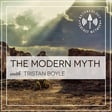
The Modern Myth of Archaeology in Nigeria with Ajayi Boluwaji - Episode 15
This episode was a privileged to record, I sat down with Ajayi Boluwaji, an archaeology based in Nigeria to talk about the similarities and differences when working in that part of the world. We discuss the colonial hangover that has greatly affected the perception of archaeology as well as the perceived economic disadvantage to doing archaeology.
Ajayi describes how community archaeology is the way forward, in order to unravel and better interpret the past in Nigeria, by connecting people to their heritage and demonstrate the capability of the populations who lived in Nigeria, hundreds or thousands of years ago.
He describes how his Yoruba heritage informs the work he does and where his passion for archaeology comes from. We also discuss what archaeologists around the world can do to help and support their colleagues in Nigeria. For more information you can find
I ask about regional differences in archaeology and about conferences that happen in Nigeria for archaeologists.
Archaeological Association of Nigeria Conference - Link
Archaeological Association of Nigeria Facebook Page
